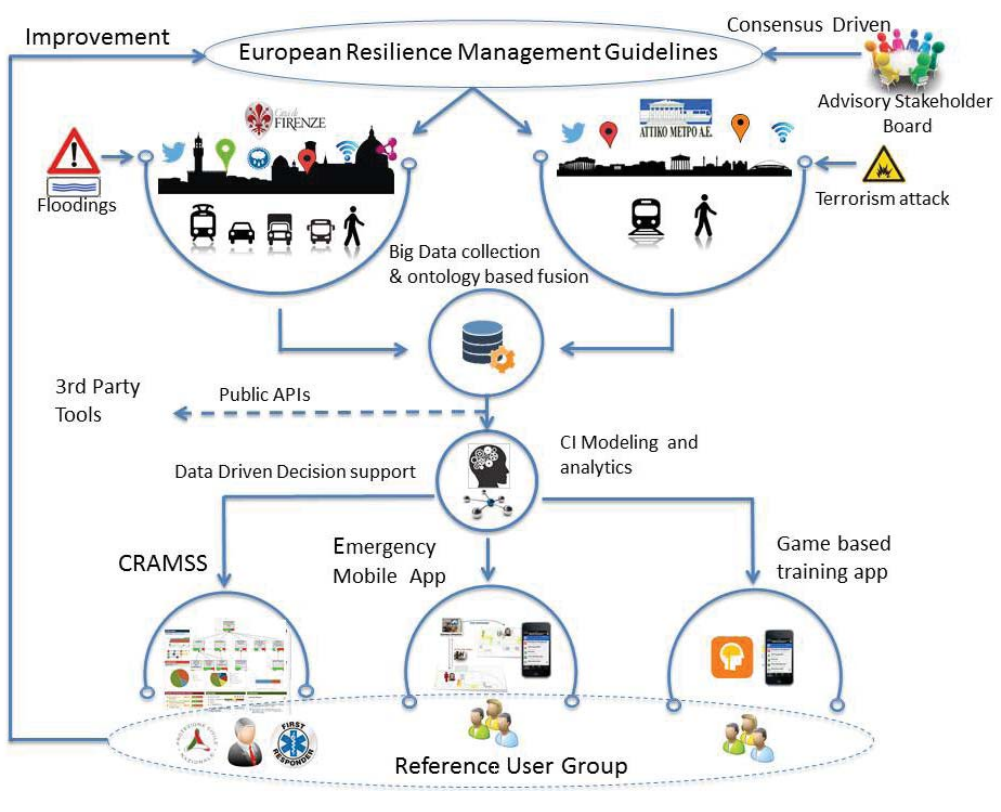RESilience management guidelines and Operationalization appLied to Urban Transport Environment
Funding Programme: Horizon 2020 programme under Grant Agreement n°653460
Start – end year: 2015 – 2017 (ongoing)
Partnership
DISIT Lab, Department of Information Engineering, University of Florence, Italy
Earth Sciences Department, University of Florence, Italy
Department of Statistics informatics Applications (DiSIA) “G. Parenti”, University of Florence, Italy
Thales Italia Spa, Italy
Attiko Metro, Greece Comune di Firenze, Italy
CERTH, Centre for Research and Technology Hellas, Greek
Fraunhofer IAO, Germany
HUMANIST VCE, France Swarco Mizar Spa, Italy
ADI ISG, Portugal
CMR, Italy
 Download the Newsletter 1
Download the Newsletter 1
The project
Within urban contexts, transport systems are today challenged to respond to a wide range of mobility needs, whilst coping with severe constraints of many different kinds, namely geographical, environmental, safety and security-related, among others. The Urban Transport System (UTS) is a relevant case of an interconnected system where critical infrastructure and multi decision makers (people, civil protection, public administration, etc.) are involved. Enhancing resilience in UTS is considered imperative for two main reasons:
- such systems provide critical support to every socio-economic activity – while are themselves one of the most important economic sectors in Europe
- the paths that convey people, goods and information, are the same through which risks are propagated.
High variability and uncertainty must be taken into account as constant operational factors and the understanding of phenomena emerging from complex system interactions requires models and tools that go beyond current practices based on a linear cause-effect modelling of system operations. Taking into account these considerations, the RESOLUTE project aims at developing information and data management systems to provide improved support to systems operations under high variability and uncertainty conditions. Although UTS are used as specific case study, the development of overall valid resilience guidelines is one of the goal of RESOLUTE.  RESOLUTE will define, develop and validate guidelines which will permit to operationalize the resilience concepts. With respect to this goal, it is important to highlight that operationalizing the concepts of resilience requires taking different time granularities into account, with respect to management of the critical infrastructure (short, medium and long term), as well as different “perspectives” (physical, service and cognitive level). Furthermore, approaches and tools for network/graph analysis and data analysis, have been also identified with the aim to model, analyze and simulate the behavior of a complex UTS and possible disruptive events.
RESOLUTE will define, develop and validate guidelines which will permit to operationalize the resilience concepts. With respect to this goal, it is important to highlight that operationalizing the concepts of resilience requires taking different time granularities into account, with respect to management of the critical infrastructure (short, medium and long term), as well as different “perspectives” (physical, service and cognitive level). Furthermore, approaches and tools for network/graph analysis and data analysis, have been also identified with the aim to model, analyze and simulate the behavior of a complex UTS and possible disruptive events.
